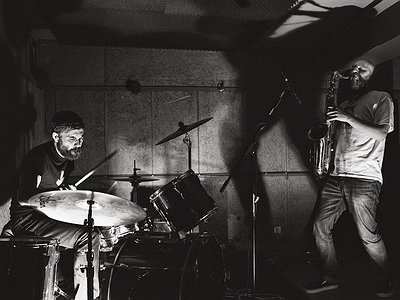Part 2
With more and more musicians creating than ever and more, what does this mean for you as an artist in terms of originality? What are some of the areas where you currently see the greatest potential for originality and who are some of the artists and communities that you find inspiring in this regard?
R: To be honest, I thinnk it's great that so much music is finding its way to your home via the Internet.
O: The more influences you have, the more ways of expressing yourself you learn. I feel it actually makes it easier to be original.
What constitutes a good live performance in your opinion and what’s your approach to performing on stage? How do an improvisation and the recording of this improvisation compare?
R: I think conveying energy to the audience is the most important thing you need to do during a live performance. Nobody wants to see a robot play on stage... at least I don't, where's the passion in that? Concerning improvisation on stage or in the studio: the most important thing is that you feel comfortable. Comfortable in the space, with the audience and with the other players. I think this is really essential.
O: The more bodily fluids, the better the show. We're not that into repeat takes or overdubs so I guess the same goes for recording. We should design a paper towel test for performance impact.
Listening is also an active, rather than just a passive process. How do you see the role of the listener in the musical communication process?
R: To get the most out of albums, you need to listen actively. This is easier for some records than for others. I like to actively listen to albums, but I never expect listeners to do it as well. Don't get me wrong: I think it's great when they do it! Everybody should enjoy music the way they want to, it's a personal thing.
O: I like the jump-up-and-down variety of active listening in an audience, though I'll take head nodding as well. I find active listening quite hard. I get distracted easily so I developed a kind of repeated fragmentary active listening. That does mean it can take weeks to get a good sense of an album.
How do you see the relationship between music and other forms of art – painting, video art and cinema most importantly - and in how far, do you feel, does music relate to other senses than hearing alone?
R: For me, movies, books, video-games, paintings and sculptures all influence the music I make. Not too sure how that works, but I guess it sets me in some kind of mood which is a great starting point to make new stuff.
As far as music is relating to other senses... well, I love looking at album art. That also puts me in the right mood (when done in a tasteful way).
O: I'm not a very visually oriented person so I guess I get more influenced by books and stories than images. Narrative is always in the back of my head when playing and literary ideas and stories can have an on the spot influence. I actually think of fragments of stories I've read while playing.
Reaching audiences usually involves reaching out to the press and possibly working with a PR company. What's your perspective on the promo system?
R: I like it! Let me explain a little bit: we've been using our evenings and weekends for sending out countless e-mails to reviewers for all kinds of magazines and websites during the last couple of years. Because of this we got to know some of these reviewers pretty well. They have been listening to and writing about our stuff for years. I think it's extremely cool that these reviewers have witnessed our developement over the years and I therefore trust their judgement. I think it's important to understant the reviewer's background and I don't believe in sending out automated mass-mails to thousands of possible reviewers. I believe in the strengths of the review system and that it is a great way to reach out to people you wouldn't reach in another way.
O: Damn, there's a system? It's really cool that there are people out there that put a lot of energy into writing, promoting, organizing, even recommending. Just like most of the musicians they write about or do stuff for, they're not making a living doing this either. But this also goes for commercial activities, I'm not cynical enough to believe that commercial agents just do it for the money. If there's no genuine love of music, you're better off working for a car brand.
In which way do music journalism and PR companies change the way music is perceived by the public?
R: Tough question. Actually impossible for me to answer, as it is a typical question you need to answer while analysing data. I believe they can influence the perception of the public (look at hype bands for example), but how this exactly works and which aspect is most important is still a mystery to me. Maybe it's more like a big jigsaw puzzle and all the pieces have to fall in the right place at the right time.
O: I think there are different publics, each with their own needs. Journalism and PR bring members of a public in contact music that could fit them. Sometimes that's about the next big thing, and sometimes it's about a specific obscure artistic expression.
Do you have a musical vision that you haven't been able to realise for technical or financial reasons – or an idea of what music itself could be beyond its current form?
O: The biggest constraint for me is time, not so much technical or financial limits. I'd like to explore approaching music more in terms of creating sound than the traditional rhythm, harmony and melody. But I'll get there. We're pretty productive in the meantime.
R: I'm always looking to play something more abstract than what I've done before. My biggest obstruction is my mind. I wonder if I will ever reach a point of abstraction that will fully fulfill my desire.
Listen to the music of Dead Neanderthals on their bandcamp page or their personal website.






